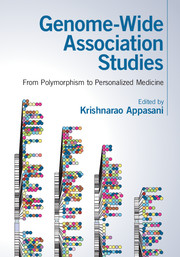Book contents
- Frontmatter
- Dedication
- Contents
- List of contributors
- Forewords
- Preface
- List of abbreviations
- Part I Genome-wide association studies
- Part II Genome-wide studies in disease biology
- Part III Single nucleotide polymorphisms, copy number variants, haplotypes and eQTLs
- Part IV Next-generation sequencing technology and pharmaco-genomics
- Part V Population genetics and personalized medicine
- Index
- Plate section
Preface
Published online by Cambridge University Press: 18 December 2015
- Frontmatter
- Dedication
- Contents
- List of contributors
- Forewords
- Preface
- List of abbreviations
- Part I Genome-wide association studies
- Part II Genome-wide studies in disease biology
- Part III Single nucleotide polymorphisms, copy number variants, haplotypes and eQTLs
- Part IV Next-generation sequencing technology and pharmaco-genomics
- Part V Population genetics and personalized medicine
- Index
- Plate section
Summary
DNA neither cares nor knows. DNA just is. And we dance to its music
Richard Dawkins, English evolutionary biologist and science writer (1941–)In 1994, more than two decades ago, Francis Collins (the present Director of National Institutes of Health) expressed his view that “finding genes is like trying to find a needle in a haystack.” In the pre-genomic era (prior to the Human Genome Project), geneticists were primarily focused on family-based linkage studies that examined simple Mendelian disorders, hereditary diseases caused by the malfunction of a single gene. In those days, it was difficult to study complex diseases like cancer or diabetes, which are influenced by multiple genes and multiple environmental factors. After completion of the sequencing of the “human genome” in early 2001, the big buzz in biology switched to understanding the complex diseases. From that time onwards, scientific efforts became increasingly globalized and increasingly intimate collaboration between academia and industry developed. Advances in genomic technologies have contributed to the development and use of new tools such as Genome-Wide Association Studies. Genome-Wide Association Studies (GWAS) were designed to survey the role of common genetic variations in complex human diseases. It was thought that GWAS would have the advantage of not relying on prior knowledge of biological pathways compared with “candidate gene-based studies,” and it was also expected that GWAS would have higher power and finer resolution to identify genetic variants in the genome.
Another global collaborative effort was initiated in 2003, with the “HapMap Project” being established to characterize the haplotype patterns in the human genome and subsequently to identify single nucleotide polymorphisms. In the past decade GWAS has been adopted to study the genomics of complex traits of several diseases ranging from leukemia, obesity, diabetes, and coronary heart diseases to neurological diseases. GWAS research has aided in the discovery of hundreds of common variants whose allele frequencies are statistically correlated with various illnesses and traits. However, these studies did not establish any significant biological or clinical relevance in terms of prognosis and/or treatment.
Genome-wide Association Studies: From Polymorphism to Personalized Medicine is intended for those in the biotechnology, genetics, genomics, pharmaco-genomics, and molecular medicine fields.
- Type
- Chapter
- Information
- Genome-Wide Association StudiesFrom Polymorphism to Personalized Medicine, pp. xxiii - xxvPublisher: Cambridge University PressPrint publication year: 2016



